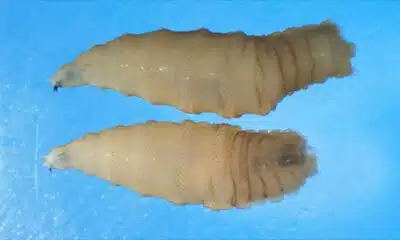News from the South - Texas News Feed
Texas PFAS bill misses key deadline
“Texas bill seeking to keep toxic “forever chemicals” off farmland misses key deadline” was first published by The Texas Tribune, a nonprofit, nonpartisan media organization that informs Texans — and engages with them — about public policy, politics, government and statewide issues.
Sign up for The Brief, The Texas Tribune’s daily newsletter that keeps readers up to speed on the most essential Texas news.
A bill aimed at limiting the spread of toxic chemicals on Texas farmland has hit a political wall — missing a key deadline that decreases its likelihood of passage this session.
House Bill 1674, introduced by Rep. Helen Kerwin, R-Cleburne, aims to regulate the use of fertilizers made from treated sewage, also known as biosolids, by requiring regular testing for PFAS — a group of long-lasting, harmful chemicals often called “forever chemicals.”
Supporters of the bill say it would protect agricultural land and the nation’s food supply from dangerous chemicals that don’t break down and are linked to health problems including cancer, birth defects, liver damage, and immune system disorders. However, opponents — including wastewater utilities — say the measure lacks clarity and could drive up disposal costs of biosolids without offering other alternatives to get rid of the sludge.
Kerwin, who is in her first legislative session after being elected in November, says the bill is her top priority — it’s the first bill she filed after becoming a lawmaker. And the proposal has won bipartisan support in the House, where 75 of her colleagues signed on as either authors or co-authors.
The House Environmental Regulation Committee heard testimony on the bill last week. Although 74 people had signed up to speak on the bill — 34 in support, 33 against, the rest neutral — only about half got the chance after waiting more than 18 hours for the bill to be heard. After two and a half hours of testimony and debate, the committee left the bill pending.
At this point, its chances of advancing further in the legislative process are slim. Monday was the deadline for House bills to advance out of committee, although there are ways to revive bills up to the end of the legislative session.
“We are not out to impact a large industry, but we just want to begin the narrative so that we can start preventing the disposal of these biosolids,” Kerwin said at the hearing.
A number of Texas wastewater plants have contracts with fertilizer companies to take their biosolids. Those companies market the fertilizers as nutrient rich and environmentally friendly and sell them to farmers as a cheaper alternative.
The bill would require companies that manufacture products made from biosolids to test them monthly for certain PFAS before selling them. Products exceeding certain PFAS limits would need to dispose of them through incineration or at a landfill that will accept them. Companies would be required to publish results online, and violators could face criminal penalties.
PFAS contamination is already impacting Texans. The bill comes after at least five farmers in Johnson County sued a fertilizer company alleging that PFAS-contaminated fertilizer made from Fort Worth’s municipal waste poisoned their land, killed their livestock, and left them unable to sell anything produced on their farms. County officials issued a disaster declaration earlier this year asking for Gov. Greg Abbott to request federal disaster assistance after dangerous levels of contamination were found on agricultural land.
Dana Ames, the environmental crime investigator who discovered PFAS contamination in Johnson County farmland, testified at the hearing that started at 1 a.m last Thursday.
“We’ve gotten a lot of calls from a lot of farmers that have felt deceived,” she said. “They feel like they’ve been duped and lied to … by the companies that are encouraging them to use the product.”
Nationally, more than half of sewage sludge was treated and spread on land, according to one study; 19 billion pounds of it was spread on American farms between 2016 and 2021, the nonprofit Environmental Working Group found in 2022.
“Across the country family farms like mine are vanishing, not just from economic pressure, but from environmental negligence,” said Karen Coleman, a farmer from Johnson County.
Coleman and her husband Tony took over her father’s farm in 2018. The couple didn’t spread biosolids-based fertilizer on their land, but they claim storm runoff from a nearby property that used the fertilizer poisoned their land.
Groups representing wastewater treatment operators, water utilities and the chemical industry testified in opposition to Kerwin’s bill, warning that the bill would have sweeping consequences for how Texas manages biosolids and create costly logistical challenges for cities and utilities without fully understanding the sources or risks of PFAS.
“[The bill] creates a de facto ban on land application… and would result in significant increases in wastewater rates paid by the public,” said Sarah Kirkle, policy director at the Texas Water Association.
Kirkle and others raised logistical concerns, saying there are only two labs in Texas currently offering PFAS testing for biosolids. She also said there’s a lack of short-term storage for biosolids awaiting test results, and uncertainty around landfill space — all of which would make compliance difficult under the bill’s timeline.
Rep. Tom Oliverson, R-Cypress and a member of the committee, challenged the idea that land application of biosolids should continue at all — especially given emerging concerns about PFAS contamination.
“It seems so obvious that the solid material left over from wastewater treatment is probably not the best thing to spread on land we’re going to grow food on,” Oliverson said. “How did we ever get to a point where someone thought that was a bright idea?”
Julie Nahrgang, executive director with the Water Environment Association of Texas, pushed back, arguing that biosolids recycling is a long-regulated, widely practiced method supported by the Clean Water Act. She said the real focus should be on identifying and regulating the sources PFAS comes from.
“Let’s ensure that [PFAS] do not make their way into the environment, to then be passively received by utilities,” she said. “Let’s understand that before we create legislation that impacts all of Texas and impacts us overnight.”
Oliverson remained unconvinced. “Just because something’s been done historically doesn’t mean it’s safe,” he said. “We used to put asbestos in for insulation for a long time and we thought that was a good idea, and then we realized it caused cancer.”
Logan Harrell, representing the Texas Chemistry Council, cautioned that the bill sets a precedent for legislating environmental standards directly, rather than deferring to agencies like the Texas Commission on Environmental Quality, the state’s environmental regulator. “This bill departs from the standard process,” he said.
The hearing highlighted a key regulatory dilemma: no Texas agency currently has both the authority and responsibility to monitor PFAS in biosolids that are applied to land. Until that changes, officials said, Texas will remain limited in its ability to assess risks or enforce protections.
The TCEQ, which permits biosolids disposal, acknowledged that it has not conducted its own PFAS testing in Johnson County. Instead, the agency relied on third-party data provided by the county to draw conclusions. Lawmakers pushed back on that approach.
“You didn’t generate any of your own data,” Oliverson said. “You’re just taking their word.”
Sabine Lange, TCEQ’s chief toxicologist, said the data the agency reviewed showed PFAS levels below the agency’s own limits it has set for soil and water. Those limits, originally developed in 2011, are now being updated to reflect the growing body of toxicology research.
There is a lot of buzz surrounding PFAS — the chemicals are under increasing scrutiny nationwide. Nearly a dozen Texas counties have passed resolutions urging farmers to stop using biosolids on their land until further testing is conducted. And states like Maine, Vermont, Michigan, and New York have already implemented bans or strict testing protocols.
Last year, Texas Attorney General Ken Paxton filed a lawsuit against chemical giants 3M and DuPont, accusing them of misleading the public about the risks of PFAS in various consumer products.
Earlier this month, the U.S. Environmental Protection Agency Administrator Lee Zeldin outlined the agency’s plans to address PFAS contamination, such as establishing a liability framework to hold polluters accountable. The announcement also said it would continue soliciting public comment on a risk assessment of biosolids, which found fertilizers that contain treated sewage tainted with PFAS can pose a health risk to people who consume milk, eggs and beef.
And most recently, during a visit to Texas A&M University in College Station, U.S. Health Secretary Robert F. Kennedy Jr. told WFAA that addressing PFAS contamination was a “high priority” for him. He said he was aware of the situation in Johnson County and is working with the EPA to come up with solutions like “ending the production of PFAS.”
Days after the hearing, Kerwin said she remains encouraged, even if the bill doesn’t advance this session.
“I think the door is opening where we can address this going forward,” she said, acknowledging that the legislation will likely need to be reintroduced next session.
Disclosure: Texas A&M University has been a financial supporter of The Texas Tribune, a nonprofit, nonpartisan news organization that is funded in part by donations from members, foundations and corporate sponsors. Financial supporters play no role in the Tribune’s journalism. Find a complete list of them here.
First round of TribFest speakers announced! Pulitzer Prize-winning columnist Maureen Dowd; U.S. Rep. Tony Gonzales, R-San Antonio; Fort Worth Mayor Mattie Parker; U.S. Sen. Adam Schiff, D-California; and U.S. Rep. Jasmine Crockett, D-Dallas are taking the stage Nov. 13–15 in Austin. Get your tickets today!
This article originally appeared in The Texas Tribune at https://www.texastribune.org/2025/05/14/texas-pfas-forever-chemicals-biosolids-fertilizer-legislation-stalled/.
The Texas Tribune is a member-supported, nonpartisan newsroom informing and engaging Texans on state politics and policy. Learn more at texastribune.org.
The post Texas PFAS bill misses key deadline appeared first on feeds.texastribune.org
Note: The following A.I. based commentary is not part of the original article, reproduced above, but is offered in the hopes that it will promote greater media literacy and critical thinking, by making any potential bias more visible to the reader –Staff Editor.
Political Bias Rating: Centrist
This content provides a balanced overview of the legislative debate surrounding PFAS chemical regulation in Texas. It presents viewpoints from both supporters and opponents of the bill, including quotes from lawmakers, experts, and stakeholders across the political spectrum. The article also contextualizes the issue through references to bipartisan support, regulatory challenges, and broader national concerns. The coverage focuses on facts and multiple perspectives without strong editorializing, reflecting a neutral, centrist stance.
News from the South - Texas News Feed
It's a love story: Taylor Swift, Travis Kelce announce engagement
SUMMARY: Taylor Swift and Kansas City Chiefs tight end Travis Kelce are engaged, announcing it on Instagram with a photo of Kelce proposing in a garden and showcasing Swift’s dazzling “Old Mine brilliant cut” ring. The couple, both 35, began dating in 2023 after Kelce attended Swift’s Eras Tour. Despite early challenges, including Kelce’s unsuccessful attempt to give Swift a friendship bracelet with his number, their relationship blossomed. Swift has supported Kelce at numerous games, including two Super Bowls, while Kelce frequently attends her concerts. Their relationship has garnered massive media attention and was featured in ESPN’s documentary “The Kingdom.” Kelce’s parents praise their bond as genuine and deserving.
The post It's a love story: Taylor Swift, Travis Kelce announce engagement appeared first on www.kxan.com
News from the South - Texas News Feed
We're excited for National Dog Day!
SUMMARY: To celebrate National Dog Day, the studio welcomed three dogs: Mac, Sandy, and Leo. Sandy sports a playful lipstick kiss from Kim Castro, while lively one-year-old Leo kept everyone entertained. The dogs’ owners, also producers, shared that it’s usually breakfast, walk, or nap time for them. The studio enjoyed the furry therapy vibe and encouraged viewers to treat their dogs with special offers from PetSmart (buy one, get one 25% off on treats), Lazy Dog Restaurant and Bar (coupon with dog bowl and entree), and free Puppuccinos from Starbucks. Viewer-submitted dog photos added to the joyful celebration of our furry friends.
We had in-studio guests to help us celebrate.
News from the South - Texas News Feed
Israeli military strikes hospital in Gaza twice
SUMMARY: Israeli forces struck Nasser Hospital in Gaza twice, killing at least 20, including first responders and journalists. The first strike hit the hospital’s upper level in Khan Yunis, and a second strike occurred as rescue crews arrived. Israeli Prime Minister Benjamin Netanyahu called it a “tragic mishap” and said a thorough investigation is underway. The IDF confirmed the strike, expressing regret for civilian harm and denying targeting journalists, blaming Hamas for using civilian infrastructure as shields. Despite a proposed ceasefire reportedly accepted by Hamas, Israel continues its offensive in Gaza City. The Israeli Security Cabinet will discuss ceasefire talks amid growing pressure to end the war.
Israeli forces launched a strike on a hospital in Gaza and then as first responders and journalists arrived at the scene, they struck the hospital again. At least 20 are dead after the two hospital air strikes.
Subscribe to FOX 4: https://www.youtube.com/fox4news?sub_confirmation=1
Dallas news, weather, sports and traffic from KDFW FOX 4, serving Dallas-Fort Worth, North Texas and the state of Texas.
Download the FOX LOCAL app: fox4news.com/foxlocal
Watch FOX 4 Live: https://www.fox4news.com/live
Download the FOX 4 News App: https://www.fox4news.com/apps
Download the FOX 4 WAPP: https://www.fox4news.com/apps
Follow FOX 4 on Facebook: https://www.facebook.com/Fox4DFW/
Follow FOX 4 on Twitter: https://twitter.com/FOX4
Follow FOX 4 on Instagram: https://www.instagram.com/fox4news/
Subscribe to the FOX 4 newsletter: https://www.fox4news.com/newsletters
-
News from the South - Kentucky News Feed7 days ago
First of its kind clinical trial offers new hope for Kentuckians at risk of dementia
-
Our Mississippi Home6 days ago
MSU Unveils Mixed-Use Development Featuring Boutique Hotel, Cultural Landmark
-
News from the South - Alabama News Feed6 days ago
Grants to boost local emergency alert systems in question as public media agency closes
-
News from the South - Arkansas News Feed6 days ago
‘Alligator Alcatraz’ probed by Dems as ICE detention centers multiply in states
-
News from the South - Arkansas News Feed5 days ago
New I-55 bridge between Arkansas, Tennessee named after region’s three ‘Kings’
-
News from the South - West Virginia News Feed7 days ago
WV groups call on Morrisey, McCuskey to push against end of federal solar program
-
News from the South - Texas News Feed3 days ago
DEA agents uncover 'torture chamber,' buried drugs and bones at Kentucky home
-
Local News6 days ago
Winged ferry that glides like a pelican tested for coastal transportation













































